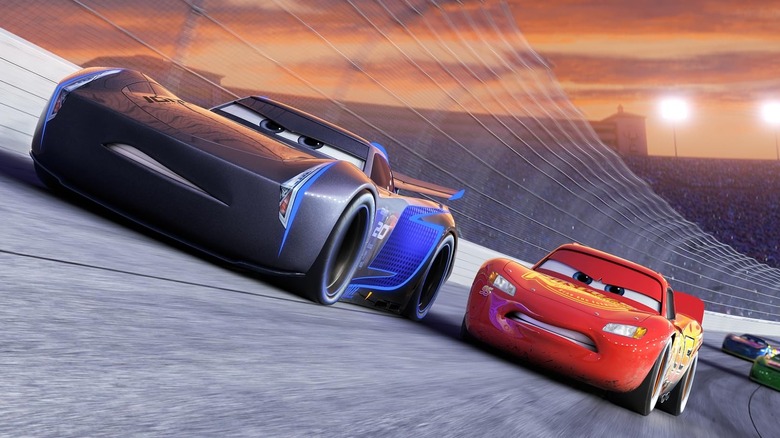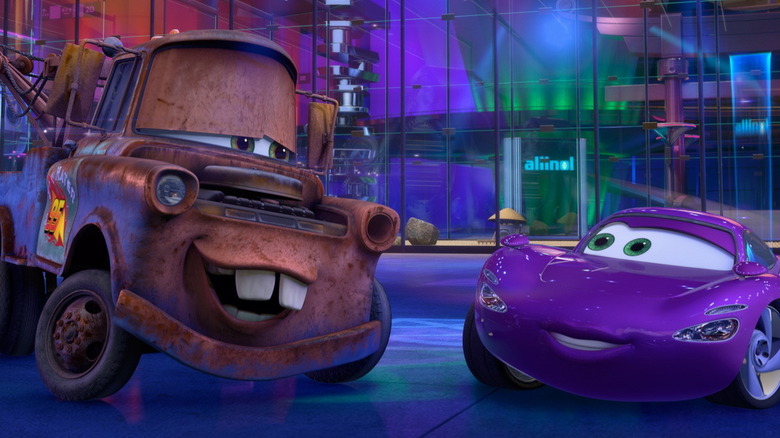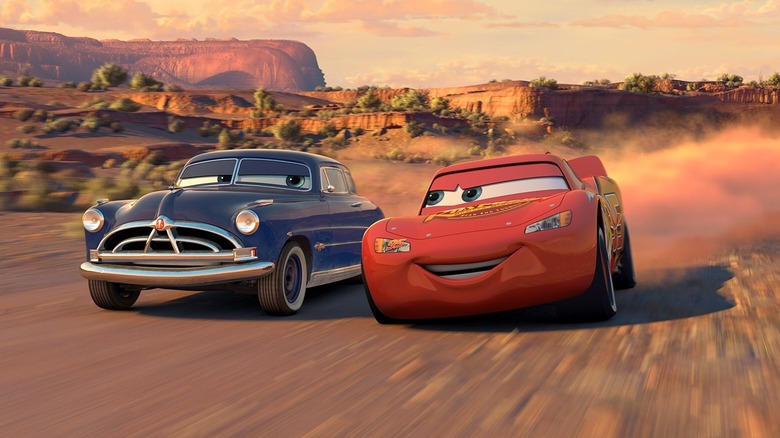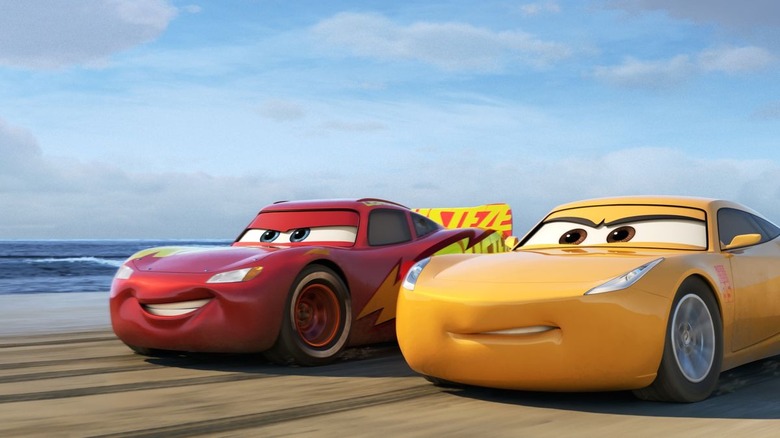Every Movie In Pixar's Cars Franchise, Ranked
When my younger brother was growing up, he went through an extreme car phase. We're talking collecting Micro Machines of every variety and cruising around in an electric kids Ride-On Jeep. What I'm saying is, when Pixar's "Cars" films proved hugely popular with younger Millennials and the first wave of Gen Z-ers starting in the '00s, I understood why. I was there, Gandalf.
Out of all of the animation powerhouse's franchises, "Cars" has always been the most contentious. The "Cars" universe itself makes no sense (everything in this world are vehicles for some reason, even insects), which has spawned all manner of dark fan theories, including that these movies take place in a post-apocalyptic future where cars gained sentience Skynet-style and murdered all the humans. Also, the personalities of the vehicles tend to be based on broad cultural or ethnic stereotypes associated with their models. Meanwhile, their personal interests are primarily limited to racing because, again, they're all cars, so there's only so much room for variety when it comes to the types of stories these films can tell. (By the way, while I'm not going to include them in my ranking, I can confirm that the "Planes" spin-offs produced by the defunct Disneytoon Studios have the same problems, only doubly so and with worse animation.)
And yet ... there are compelling themes woven throughout the "Cars" films about how what's old is often heartlessly abandoned whenever something newer and shinier — but not necessarily better — comes along, as well as the value of preserving and building on the good things that came before. So, in the spirit of that sentiment, let's take a look back at both the highs and lows of the "Cars" movies and rank them accordingly.
3. Cars 2 (2011)
Remember what I said about the "Cars" characters being based on broad stereotypes? I was mainly (but not only) referring to the shabby tow truck Mater, who's depicted by Daniel Lawrence Whitney as a "redneck" caricature in the same vein as his standup comedian persona, Larry the Cable Guy. "Cars 2" bumps Mater up from his sidekick gig in the first film to protagonist, which should be an automatic red flag; even if you liked the character in his first go-around, there was nothing to suggest he's capable of carrying an entire movie on his shoulders (er, wheels). If you loathed the character, well, his shtick here gets awfully tired awfully fast.
The plot for "Cars 2," which features disgraced former Pixar chief creative officer John Lasseter and Bradford Lewis as co-directors and writers, has Mater being mistaken for a suave super-spy and ensnared in a corporate malfeasance scheme involving the oil industry and alternate fuels. To its credit, the Disney-backed movie manages to sneak some progressive political messaging in under Mickey Mouse's nose, although that's difficult to appreciate given its hero's repetitive, tedious antics and the otherwise paper-thin, unsubstantial story around him. If it weren't for the intricate animated textures and the breakneck car chase sequences, you'd swear this was one of those quick-and-dirty follow ups churned out by Pixar's competition to cash in on one of their own popular brands.
2. Cars (2006)
When "Toy Story" came out in 1995, it revolutionized animation, but it also contributed directly to 2D animation being perceived as inferior and going out of style in the years that came after. One wonders whether Pixar's creatives had some guilt about their role in that weighing in the backs of their minds when they made "Cars" just over a decade later. The film follows the cocky, hotshot racecar Lightning McQueen (Owen Wilson) as he's accidentally marooned in a dusty small town known as Radiator Springs. Having fallen on hard times since the construction of a new interstate meant would-be customers traveling by no longer had to stop there for their business, Radiator Springs and its eclectic inhabitants could be read as a metaphor for the old-school cartoons and characters who were soon deemed yesterday's business with the advent of computer animation.
The story for "Cars," which was also directed and co-written by Lasseter, is a fairly routine "Doc Hollywood"-inspired romp, with Lightning getting some much-needed lessons in humility from crusty Radiator Springs local and secret former racing legend Doc Hudson (Paul Newman). Still, beneath its glistening surface and menagerie of toyetic characters (including, yes, Mater), the film has what Roger Ebert identified as "a little something profound lurking around the edges. In this case, it's a sense of loss." It might not have the pathos of Pixar's strongest work, but there's something to the way "Cars" preaches forgoing the out-with-the-old-in-with-the-new mentality of late stage capitalism and realizing that certain things from the past deserve to be carried over into the future.
1. Cars 3 (2017)
What happens when you yourself are no longer the cool new kid on the block and have instead become the equivalent of a middle-aged geezer struggling to avoid getting shoved out of the spotlight entirely? A character dealing with an existential crisis isn't exactly the most kid-friendly story, which may in part account for "Cars 3" being the lowest-grossing entry in the series. It is, however, an organic continuation of the original "Cars" and might even hit a little close to home for those who were as fresh-faced and confident as Lightning when that film came out. If Pixar's going to do anything, it will remind you of the march of time and the inevitability of change and death. There's a reason we all cry at these things!
The thing that elevates "Cars 3" above the first film is the franchise's willingness to mature with its audience. It's still a "Cars" movie, yet there's only a bare minimum of Mater and the passing of the great Paul Newman (and Doc along with him) imparts the proceedings with an even deeper sense of loss. While it seems to be a passing of the torch narrative at first glance, with Lightning gaining an apprentice in upstart trainer Cruz Ramirez (Cristela Alonzo) as he attempts to remain competitive against a generation of younger and higher-tech racecars, "Cars 3" is really about McQueen learning to adapt to the changes in his life and maybe even reinvent himself. Toss in co-writer/director Brian Fee and his army of artists crafting some of the most visually-stunning and dynamic race scenes in the whole series, and you end up with the rare trilogy capper that crosses the finish line in record time. (Please applaud, people, that's my first and only car-related pun.)



